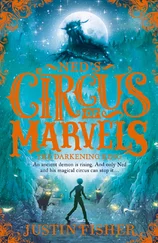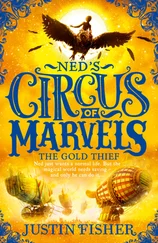“We’re going around,” Peter said.
***
The break in the perimeter was a ragged gap twenty meters across. The remains of a burned-out tanker truck lay on its side near the opening. Probably, Peter thought, the driver had tried to run the blockade.
They continued on. The landscape was changing again, thickening with structures as they moved into the city. No one was talking; the only sounds were the low rumble of the engine and the scrape of weeds on the underside of the Humvee’s carriage. They had somehow gotten on Las Vegas Boulevard again; a creaking sign, still held aloft on its wires above the street, jostled in the wind. The buildings were larger now, monumental in scope, towering above the roadway with their great ruined faces. Some were burned, empty cages of steel girders, others half-collapsed, their facades fallen away to reveal the honeycombed compartments within, dressed with dripping gardens of wire and cable. They passed beneath signs bearing mysterious names: Mandalay Bay. The Luxor. New York New York. Rubble of all kinds littered the spaces between the buildings, forcing Peter to move at a creep. More Humvees and tanks and sandbagged positions; there had been a battle here. Twice he had to stop completely and search for an alternate route around some obstacle.
“This is too dense,” Peter said finally. “We’ll never make it through. Caleb, find me a way out of here.”
Caleb directed him west, onto Tropicana. But a hundred meters later the road disappeared, subsumed once again under a mountain of rubble. Peter reversed direction, returned to the intersection, and fought his way north again. They were stopped this time by a second perimeter of concrete barricades.
“It’s like a maze in here.”
He tried one more route, heading farther east. This, too, was impassable. The shadows were lengthening; they had maybe half a hand of good light left. It had been a mistake, he knew, to head through the heart of the city. Now they were trapped.
He took the radio from the dashboard. “Any ideas, Sara?”
“We can go back the way we came.”
“It’ll be dark by the time we get out of here. We don’t want to be caught out in the open, not with all these high points.”
Alicia dropped down from the roof. “There’s one building that looks tight,” she said quickly. “Back down this road about a hundred meters. We passed it coming in.”
Peter relayed this information to the second Humvee. “I don’t see that we have a lot of options.”
It was Hollis who answered. “Let’s do it.”
They reversed course. Angling his eyes upward through the windshield, Peter identified the structure Alicia had indicated: a white tower, fantastically tall, rising from the lengthening shadows into sunlight. It appeared solid, though of course he couldn’t see the other side; the rear of the building might be completely peeled away, for all they knew. The structure was separated from the roadway by a masonry wall and a broad, bowl-like depression, with pipes extruding from the drifts of sand and debris that littered the bottom. Peter was worried they would have to traverse this somehow, or else leave the Humvees on the street, but then they came to a break in the wall just as Alicia called down, “Turn here.”
He was able to pull the Humvee right up to the base of the tower, parking beneath a kind of portico, wreathed with skeletal vines. Sara pulled in behind him. The front of the building was boarded up, the entrance barricaded by sandbags. Exiting the vehicle, Peter felt a sudden chill; the temperature was dropping.
Alicia had opened the rear compartment and was hurriedly passing out packs and rifles. “Just take what we’ll need for tonight,” she ordered. “Whatever we can carry. Bring as much water as you can.”
“What about the Humvees?” Sara asked.
“They’re not going anywhere on their own.” Alicia, after drawing a belt of grenades over her head, checked the load on her rifle. “Hightop, do you have a way in yet? We’re losing the light here.”
Caleb and Michael were furiously working to pry loose the covering from one of the windows. With a crack of splitting plywood it yanked loose from the frame, revealing the glass behind it, caked with grime. A single stroke from Caleb’s pry bar and the glass shattered.
“Flyers,” he exclaimed, wrinkling his nose, “what’s that stink?”
“I guess we’ll find out,” Alicia said. “Okay, everybody, let’s move.”
Peter and Alicia climbed through the window first. Hollis would bring up the rear with Amy and the others in between. Dropping inside, Peter found himself in a dark hallway, running parallel with the front of the building. To his right stood a pair of metal doors, chained shut through the handles. He stepped back to the open window.
“Caleb, pass me a hammer. The pry bar, too.”
He used the sharp end of the pry bar to shatter the chain. The door swung free, revealing a wide, open space, more region than room, remarkably undisturbed. Apart from the smell-a tart chemical scent, vaguely biological-and a heavy layer of dust that coated every surface, the impression it gave was less of ruin than abandonment, as if its inhabitants had departed days ago, not decades. At the center of the space stood a large stone structure, evidently some kind of fountain, and on a raised platform in the corner, a piano, tented with cobwebs. A long counter was positioned to the left.
Peter tilted his gaze upward to the ceiling, which was bisected by elaborately carved molding into discrete, convex panels. Each was ornately painted: winged figures with sad, dewy eyes and plump-cheeked faces, set against a sky of billowing clouds.
Caleb whispered, “Is it… some kind of church?”
Peter didn’t answer; he didn’t know. Something about the winged figures on the ceiling was disquieting, even a little ominous. He turned to see Amy standing by the cobwebbed piano, gazing upward like the rest of them.
Then Hollis was beside him. “We better get to higher ground.” He felt it, too, Peter could tell, this ghostlike presence hovering over them. “Let’s try to find the stairs.”
They advanced into the building’s interior down a second, wider hallway, lined with stores-Prada, Tutto, La Scarpa, Tesorini-the names meaningless but strangely musical. There was more damage here, windows shattered, shards of glinting glass scattered over the stone floor and crunching under the soles of their boots. Many of the stores appeared to have been ransacked-counters smashed, everything overturned-while others seemed untouched, their peculiar, useless wares-shoes no one could actually walk in, bags that were too small to carry anything-still displayed in the windows. They passed signs that said SPA LEVEL and POOL PROMENADE, with arrows pointing down other, adjacent hallways, and banks of elevators, their gleaming doors sealed, but nothing that said STAIRS.
The hallway ended in a second open area, as large as the first, receding into darkness. There was something subterranean about it, as if they had stumbled upon the entrance to an immense cave. The smell was stronger here. They broke their light sticks and moved forward, sweeping the area with their rifles. The room appeared to be filled with long banks of machines, like nothing Peter had ever seen before, with video screens and various buttons and levers and switches. Before each was a stool, presumably where the machines’ operators had sat, performing their unknown function.
Then they saw the slims.
First one and then another and then more and more, their frozen figures resolving out of the gloom. Most were seated around a series of tall tables, their postures grimly comical, as if they’d been overcome in the midst of some desperate, private act.
Читать дальше












